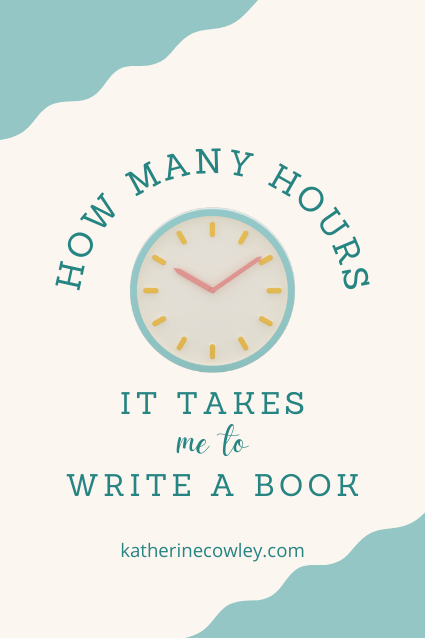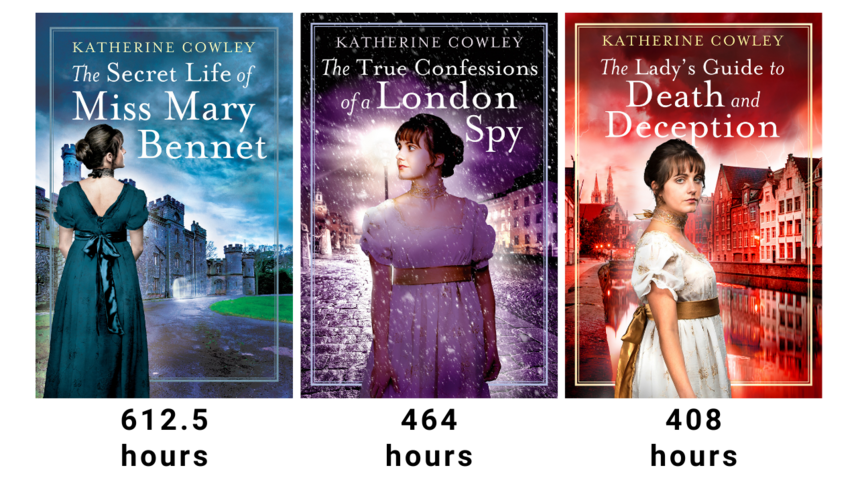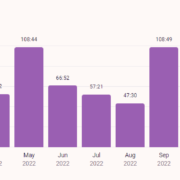How Many Hours It Takes Me to Write a Book
On one of my blog posts recapping a year in writing, a reader recently asked how long it takes me to write a novel, and how this time breaks down between drafting and revision.
Because I track my writing time, I can answer both questions rather easily.
Question 1: Total Number of Hours to Write A Novel
For the past three novels I have written, it has taken me between 400 and 650 hours to write and revise the book.
Question 2: The Time Breakdown (How these hours were spent)
This question gets a little more complicated, because I wrote the first drafts for The Secret Life of Miss Mary Bennet and The True Confessions of a London Spy at the same time. However, I went back through my time tracking app, did some number crunching, and broke things out.
Disclaimer: I came up with the premise for the series in 2013, and I did some initial research, and then spent years thinking about the characters and their motivations, daydreaming about scenes, planning emotional arcs, etc. None of this time is included in the following charts, which only include time spent after mid-2017.
Disclaimer 2: rounding occurred at various points when I exported from my time tracking app and then added numbers in Excel. If the numbers are off by an hour or two, then it’s because you’re not seeing all the rounding.
Time Spent Writing and Revising The Secret Life of Miss Mary Bennet
- Research
- Outlining
- Draft 1
- Draft 2
- Draft 3
- Newspaper Research
- Draft 4
- Draft 5
- Draft 6 (with agent)
- Draft 7 (with agent)
- Revisions with Publisher
- Other Tasks
- 76 hours
- 34 hours
- 113 hours
- 88.5 hours
- 108 hours
- 18 hours
- 6 hours
- 14.5 hours
- 77.5 hours
- 17 hours
- 33 hours
- 27 hours
Note: the first draft, which took me 113 hours, was spread out (along with research and outlining) over a period of 11 months. This was a novel that took time to simmer and develop!
What each draft focused on
First draft: The first draft is for me to get the story down. I do revise some as I go, but I also leave plenty of comments for myself for things to fix later. Sometimes I will skip scenes or chapters that I know I will need to add in a future draft, and I am often missing names for key characters (I’ll have lots of _________ to show that I need to add it later). I never show full first drafts to anyone, but I did show bits and pieces to my monthly writing group to get some initial feedback.
Second draft: This draft is the get-it-ready-to-look-at by other people draft. I fill in whatever gaps are left from the first draft, do lots of big picture changes (plot, structure, emotion, relationships, and character), and constantly tweak things at a language and sentence level.
Then I sent the book to my first round of critique partners.
Third draft: Some people break out different types of edits (structural, character, language) into different drafts. I kind of do them all at once. First I created a very large chart on my wall which helped me figure out how to fix bigger picture plot and character problems, and then I dove into changes. For me, a draft sometimes consists of multiple passes–during a single revision, I may go through chapters anywhere from 1 to 4 times, and sometimes I’ll be revising a later chapter and realize I need to go back and change something in a previous chapter that I thought was finished. I decide a draft is finished when I’ve taken care of all the things that seem most crucial–that are really bothering me. I won’t necessarily address every single thing my critique partners have suggested; some I do save for future revisions, and others I set aside and don’t incorporate.
I then added newspaper headings and sent the book to a new set of critique partners. (I like to use people who haven’t yet read the novel and can offer a fresh perspective.) In this case, draft four did not take very long, and then I started querying agents. Then I did another draft and queried more. Then I got my agent–and I wrote a post that talks about the revisions that I did with my agent.
Once the book was acquired by Tule, we did a content edit, another more minor content edit, an edit to make the book shorter, and then copyedits and proofreads.
Time Spent Writing and Revising The True Confessions of a London Spy
- Research
- Outlining
- Draft 1
- Draft 2
- Draft 3
- Newspaper Research
- Draft 4
- Draft 5
- Revisions with Publisher
- Other Tasks
- 67 hours
- 9 hours
- 48 hours
- 149.5 hours
- 11.5 hours
- 19 hours
- 71 hours
- 48 hours
- 35.5 hours
- 5 hours
You will notice that I spent a lot less time on this first draft. However, I paid for it during the second draft, which still holds its winning place as the hardest draft I have ever written in my life.
The drafting process was similar to the first book, however, because the second draft was such a major revision, in this case I did a quick third draft to clean things up before sending to critique partners.
Time Spent Writing and Revising The Lady’s Guide to Death and Deception
- Research
- Outlining
- Draft 1
- Draft 2
- Draft 3
- Newspaper Research
- Draft 4
- Revisions with Publisher
- Other Tasks
- 24 hours
- 14 hours
- 147 hours
- 64 hours
- 93 hours
- 16 hours
- 26.5 hours
- 20 hours
- 3 hours
I wrote the first draft of The Lady’s Guide to Death and Deception over a period of six months. And that was hard–I don’t think I could easily write a first draft in less than that, because I only have so many high-level creative energy on any given day or week, and there are parts of the creative process that just can’t be rushed.
Why Some Books Take More or Less Time
If I’m going to undergo some self-analysis and reflection (why not? I made charts!) then I would say that the first book in the series took the longest in part because it was the first book. I was still figuring out characters, relationships, and arcs. And I was able to apply a lot of what I figured out about the characters–as well as a lot of the research–to books 2 and 3.
My agent and my editor also taught me things about writing, and mysteries specifically, which I was able to apply in the process of writing both books 2 and 3. This truly did cut out a couple of drafts.
Also, book 3 in the series was the only book I have written in which I managed to include both the plot AND all the major sub-plots in the first draft. (In the first draft of both The Secret Life of Miss Mary Bennet and The True Confessions of a London Spy, I had most of the subplots, but the main plot was shaky.)
How Long It Will Take Me to Write Future Books
Prior to the Mary Bennet series, I wrote several (unpublished) novels, but I wasn’t as exact about keeping track of time. Based on the records I have, one novel probably took me at least 700 hours. A novella I wrote (“Tatterhood and the Prince’s Hand“) took about 144 hours.
I truly expect that all my future novels will take me at least 400 hours, and if it’s the first book in a series, it could very likely be in the 600 hour range. I’m currently working on a new secret novel, and I’ve already spent 33 hours on brainstorming and research. I could easily have another 60 to 100 hours of research and outlining before I’m ready to start writing the first draft.
I have a number of writing friends who write much more quickly than I do, but I also have plenty of writing friends who take comparable or longer amounts of time to write and revise a novel. There’s no one right way to do it, and either can produce amazing work, as long as it works well with your writing process and your other life commitments.







I love seeing all the numbers!
Writing a book is really interesting and writers put efforts through it. Great ideas you shared.